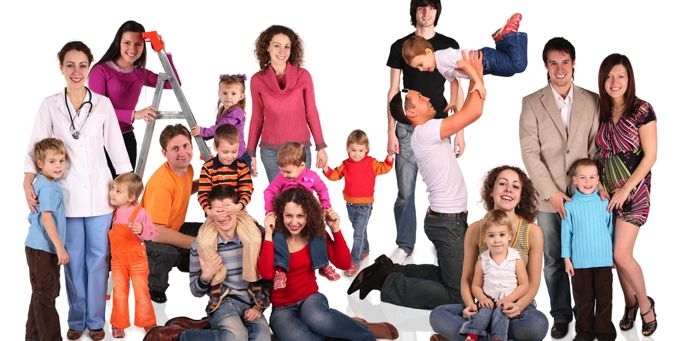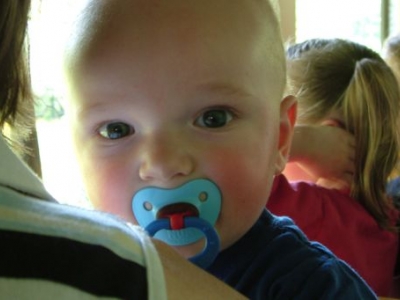
Judging parents
When it comes to parenting, it seems everyone has an opinion ... and they're not afraid to share it.
Some time ago, I was talking to a friend at playgroup who asked me what we (meaning me and my then 18-month-old daughter) were up to for the rest of the day. I replied that I was dropping my daughter off at occasional care, then going to have lunch with another friend—at which point, my friend looked at me in abject horror as if I had just said I was handing my daughter over to scientists to have medical experiments performed on her for the rest of the afternoon.
Ah, parental judgement: if you’re a parent, I’m sure you’ve faced it at some point. Someone, somewhere always has an opinion on how you’re bringing up your kids—more specifically, what you are doing wrong and, therefore, why you qualify for Worst Parent of the Year.
Now, I don’t mean judgement in the discernment (and arguably more loving) sense—for example, if another parent helpfully pointed out to you that your child is having trouble navigating the slide and needs help. After all, some things the Bible points out are clearly sinful—like neglect, physical abuse and sexual abuse. I mean judgement in a more negative, unloving and condemnatory sense—for example, if a complete stranger tells you off for giving formula to your baby and calls you a bad mother.
Why do we judge other parents?
People who dish out parental judgement out can be acquaintances, friends, family members and even strangers on the street—parents and non-parents. It isn’t always just non-Christians either; Christians can often be the worst perpetrators.
But it’s not just other people. It’s us—you and me. I too have been guilty of passing judgement on others. I may not say anything to a person’s face, but I will certainly be thinking things.
So why do we do it? Why are we so quick to judge other parents for how they parent? Several reasons come to mind (aside from the pernicious influence of reality TV).
- It makes us feel good—superior, even—about ourselves, our choices and how we’re doing as parents.
- We find it difficult to deal with people who are different from us—racially, culturally, economically, and so on—and who make different choices in their parenting style as a result.
- We want the best for all children, not just our own (which is a good thing!) However we think that we alone know what that “best” is.
- We feel we have more experience and wisdom than the mum with the newborn, the mum with only one child, etc.
Why we're no good at judging
However, the problem with parental judgement is that when you pass judgement on someone else, you are essentially putting yourself in the place of God. But you are not God and cannot possibly judge with the absolute and pure justice that God wields because of his omniscience and holiness. You will never have all the information.
You will never know the depths of another person’s thoughts and intentions. Furthermore, you have logs in your own eyes (to borrow the imagery of Matthew 7:1-5): you yourself are a sinful human being and are in no condition to pass judgement on someone else for what they do.
What can we do about parental judgement?
If you find yourself on the receiving end, the following might help:
- Develop a thicker skin and learn to let little things go. There will always be critical and judgemental people in this world, and you don’t always have to listen to what they say—particularly if they don’t really know you or your situation.
- Be humble and remain open to criticism from parties you trust—people who love you and want what’s best for you. After all, it’s not like you were imbued with all the parenting wisdom in the universe the minute your first child was born; you will always need to learn new skills and seek advice as your child grows and as more children come along (God-willing).
- Fear the Lord above all. His judgement is the only one we parents need fear. Fortunately, he promises to give us wisdom as we engage in the mammoth task of raising the offspring he has given us to know him and fear him too. So ask him for wisdom daily and seek his guidance.
Why you should stop judging other parents
If you are on the giving end of parental judgement, here's some things to think about:
- Recognise that everyone is different, for God created us all to be individuals, not clones. Therefore all marriages are different, all children are different and all families are different from one another. There are some parenting practices that suit some families more than others. And that’s okay.
- Recognise that not everyone has the luxury of choice—that some women are physically unable to breastfeed; that some parents simply cannot afford to keep one parent at home, much as they would like to; that some children will always suffer from poor sleep for one reason or another; and that some decisions are an acceptable compromise that has been reached after the parents have weighed up their children’s needs against their own. You may never understand the rationale for certain parenting practices until you see it from the parents’ point of view. Take the time to understand the ins and outs of another family’s situation. You may learn a lot about your own.
- Learn self-control and appropriate boundaries so that you will hold your tongue and not give out advice where it’s not wanted. Giving advice is a privilege that needs to be earned over time within the parameters of personal relationship. Don’t presume you have that privilege.
- Pray for the parents around you—that God will bless them with wisdom, patience and perseverance as they work out what’s best for their children in their own context.
Unfortunately this side of Jesus’ return, parental judgement will never completely leave us because it is a byproduct of sinful hearts. Until then, we must put up with people who think they know better than us what’s best for our kids. On the bright side, it’s lovely that people want what’s best for the children around us. Fortunately God knows what that best is!
For more articles from Growing Faith, subscribe to our monthly e-newsletter.
To hear about the latest books and resources from Youthworks Media, subscribe here.







